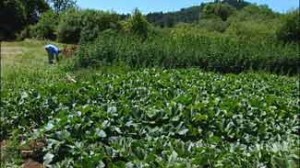Continuing with our Seeds of Life series, Willamette Valley organic seed breeder, Frank Morton, explains the benefits of open pollination in plant breeding, and the important role for farmers in the selection process to continually improve plant varieties for better local adaptation.
In open pollinated plant varieties, pollination can occur from the pollen of related species that sometimes travel great distances (as measured in miles), by insects, wind, and birds.
Open pollinated plants can be selected over time to breed a desired mix of traits, and the seeds from these plants can be reused over successive generations with highly favorable results. In particular, Morton says, organic farmers want organically bred seeds, that is, seeds which are designed to work well in an organic system. Organic farmers place a strong emphasis on maintaining soil fertility, and do not use commercial fertilizers, and other chemicals to artificially boost production yields. Organically bred seeds, may be bred for roots that travel deeper through the ground to acquire the necessary supply of nutrients that a healthy plant may require. By contrast, an organically grown seed, means only that the seeds were grown on organic soil, but will not have been bred to do better under an organic farming system.
Working with open pollinated plants, Morton provides organically bred seeds better suited for organic and sustainable farming systems, and offers farmers a means of continually improving their own crops along with the ability to reuse their seed.
By contrast, most hybrid seeds, including genetically engineered seeds with patent protections, either can not be reused under licensing restrictions, or, the hybrids have been designed not to be stable beyond their first harvest. This lock and key protection means that while farmers will continue to purchase their seeds year after year from the seed companies, they may also have to purchase an assorted mix of farm chemicals to insure the best chance of success with those seeds. Not only does this bind a farmer to the seed companies, it precludes them from cultivating varieties over time from their own selection process. As Morton emphasizes in the video, when the farmer participates directly in the selection process, he can further adapt his seed to fit his particular tastes, and growing conditions.
Check out the links below, for those interested in the Frank Morton series:
- Seeds of Life: David Vs. Goliath (published: 12-2009)
- Seeds of Life: Beta Vulgaris (12-2009)
- Seeds of Life: The Organic Seed Breeder (3-2010)
- Seeds Of Life: Hybrids and the Emergence of Seed Monopolies (3-2010)
- Seeds Of Life: Open Pollination (6-2010)
- Seeds of Life: Consolidation in the Seed Industry (7-2010)
Most of the videos featured on Cooking Up a Story were produced, filmed, and edited by Rebecca Gerendasy. Fred Gerendasy contributed as a writer to many of the posts and occasionally as the interviewer. Visit Rebecca Gerendasy Clay – Art and Fred Gerendasy Photography to see their current work.


